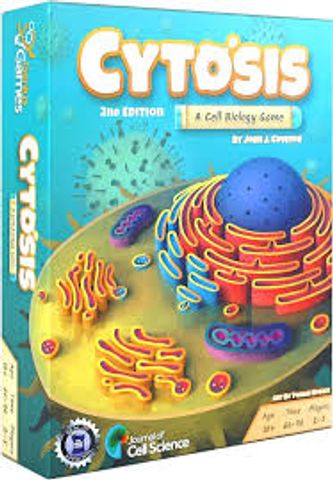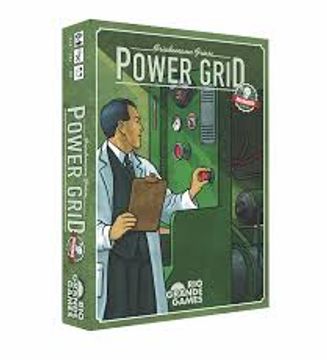Looking for more STEM games?
There are a lot of great games that use STEM as the basis for their theme and gameplay. Here are a handful for you to explore and expand your family game night with STEM fun!
A growing, but certainly not comprehensive list of STEM Game
Life Science: Flora, Fauna, and Ecology
A lot of games use nature as the context for the gameplay. The game I'm including here go a bit beyond just having animals in them, to really focusing on how those animals relate to each other, getting at the heart of the webs of relationships that is at the core of the life sciences.

Earth
Build a tableau of cards representing various types of plants, along with terrain. You grow your plants and collect sprouts, having to balance your need for soil and compost with getting new plants out, and aiming to fulfill animal needs. All of these actions gets you points at the end to determine the winner, so there are many strategies available.
Ages 13+
1-5 players

Wingspan
This beautiful game has you collect birds across three habitats - forests, grasslands, and wetlands. You have a limited number of actions each round to place birds or gather resources and activate the abilities of birds within a habitat.
Ages 10+
1-5 players

Bosk
Plant trees in a national park and try to control area, gaining points for young trees creating beautiful sights for hikers and for older trees having leaves that cover territory in the fall.
Ages 13+
2-4 players

Evolution
Players adapt species to deal with changing threats and available resources.
Ages 12+
2-6 players

Ecosystems
Draft cards representing a mix of planets, animals, and environments, with a goal of achieving the most synergistic biodiversity to earn the most points.
Ages 10+
2-6 players

Photosynthesis
As the sun moves around your forest, trees grow based on their position and height, using the power from the sunlight to grow into taller trees. Place trees strategically so their shadows will slow the growth of opponents, to earn more points.
Ages 8+
2-4 players

Mycology
Each round all players collect resources, then either purchase mushrooms or trade resources. Across the seasons, gather different mushrooms to accumulate points.
Ages 12+
2-6 players
Physical Science: Particle Physics & Chemistry
All matter is made up of atoms and subatomic particles, combined together in ways to create elements and more complex compounds. These games find ways to explore atoms, molecules, and chemical interactions in fascinating ways that help understand what is going on in the physical sciences.

Subatomic
A deck-building game where you use cards representing subatomic particles to either form elements and score points or gain more powerful proton and neutron cards that will be more useful in future rounds.
Ages 14+
2-4 players
Players draft cards of ions and noble gases to form sets of neutrally-charged compounds and stable noble gases.
Ages 8+
2-7 players

Compounded
Apply careful management of the elements to build chemical compounds and earn points.
Ages 14+
2-5 players

Periodic
Players must maneuver their way across the periodic table of the elements and use knowledge of chemical properties to achieve goals and score points.
Ages 10+
2-5 players
Life Science: Cells and Microbiology
These games focus on the building blocks of life, whether they be genes and evolution or individual cells.

Cytosis
A worker placement game that takes place within a human cell. Activate organelles to build enzymes, hormones, and hormone receptors, as well as remove waste from the cell.
Ages 10+
2-5 players

Genotype
A dice-drafting and worker placement game where players simulate Gregor Mendel's research to validate the heredity of traits in pea plants.
Ages 14+
1-5 players

Cellulose
A worker placement game that takes place within a plant cell, where players try to utilize limited resources, undergo photosynthesis, and build a cell wall.
Ages 14+
1-5 players

Pandemic
In this cooperative board game, players are a team of disease experts who travel the world trying to contain a series of spreading viruses and gather research needed to cure and eradicate the diseases.
Ages 8+
2-4 players
Scientists and Science History
The story of science is the story of people searching for answers. It's inherently compelling and dramatic ... and, as such, has provided inspiration for a number of games. Though these games get less into the particular scientific details, they give a sense of the scientists and inventors who have driven science forward.

STEM: Epic Heroes
In this set collection game, you're using cards representing real historical scientists to gather together the cards you need to make discoveries using the scientific method.
Ages 13+
2-4 players

On the Origin of Species
This game simulates Charles Darwin's voyage on the HMS Beagle, as he uncovers the natural history of animal and plant species throughout the Galapagos Islands.
Ages 10+
2-4 players

7 Wonders
In this straightforward game of civilization building, work up technology trees to build wonders for your civilization.
Ages 10+
3-7 players

Through the Ages
Guide an advancing civilization from pre-industrial roots through the development of advanced technologies. Great for sparking discussions about historical figures, scientific and technological innovations, and how those innovations have impacted the course of history. (More elaborate than 7 Wonders.)
Ages 12+
2-4 players
Engineering and Technology
These games are focused on engineering and design technology, including computer science.

Power Grid
In a classic game of economic control, compete with other players to build the best way of supplying energy to your customers.
Ages 13+
2-6 players

Power Failure
A card game where players race to build the best energy infrastructure to meet the power demands without triggering environmental collapse.
Ages 14+
2-4 players

Turing Machine
Try to identify a secret code and check your answer by prompting cards that represent a proto-computer.
Ages 14+
1-4 players

Moue Trap
Move mice through a Rube Goldberg contraption-style obstacle course, trying to use knowledge of construction and cause-and-effect to figure out the best way to avoid triggering the trap and gather the most cheese.
Ages 6+
2-4 players

Innovation Ultimate
A revamp of the classic game, Innovation Ultimate is a civilization-building game where you advance from weaker cards through a technology growth tree to discover more complicated innovations. This version includes a variety of expansions from the original game.
Ages 14+
2-5 players
Space and Exploration
Science fiction games focusing on space and planetary exploration, but with an emphasis on the science and technology involved. For example, games like Space Base and Star Wars: Rebellion are great games that involve spaceships and space travel, but there's no underlying science or technology concepts that are embedded in the game mechanics.

Terraforming Mars
Players are corporations trying to make Mars habitable by increasing the temperature, oxygen, and oceans on the red planet. A variety of strategies reach this goal, and players gain points based on the achievements they made along the way.
Ages 12+
1-5 players

High Frontier 4 All
In this complex game of space engineering, you are a corporation managing resources to build advanced rocket designs for deep space exploration.
Ages 14+
1-5 players

Spaceteam
In this fast-paced chaotic and cooperative shouting game, players are working together to repair their malfunctioning spaceship before it's too late.
Ages 10+
3-6 players
And, of course, you can also check out Eureka Science Academy!
Copyright © 2025 Eureka Science Academy Card Game - All Rights Reserved.
Powered by GoDaddy
This website uses cookies.
We use cookies to analyze website traffic and optimize your website experience. By accepting our use of cookies, your data will be aggregated with all other user data.